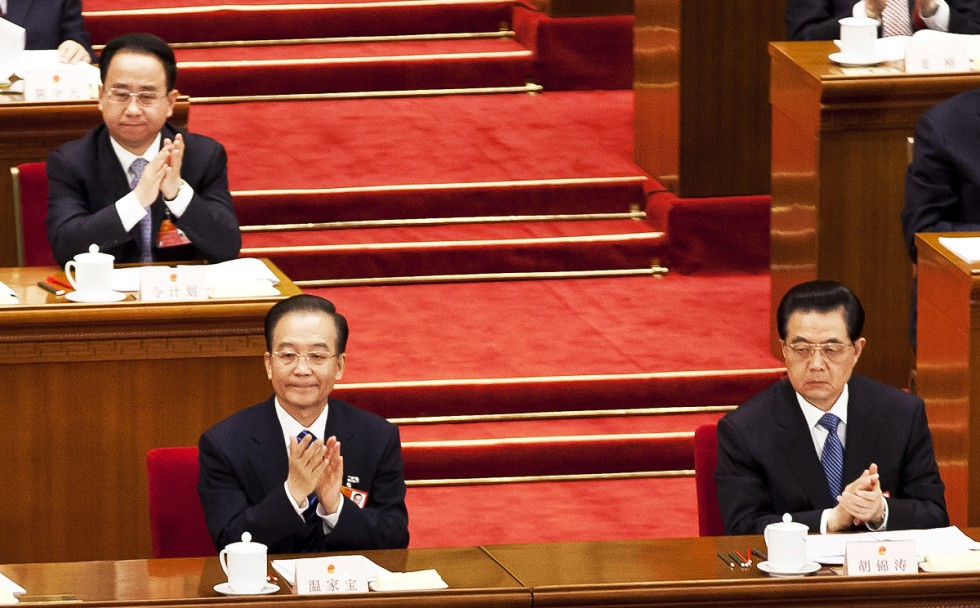How son’s death in a high-speed car crash led to powerful Chinese official’s fall from grace
Ling Jihua was tipped to become one of the next generation of leaders in China until allegations surfaced of a cover-up into a fatal road accident in a Ferrari
PUBLISHED : Tuesday, 23 December, 2014, 11:15am
UPDATED : Tuesday, 23 December, 2014, 11:58am
Staff Reporters

Ling pictured sitting behind former premier Wen Jiabao and ex-president Hu Jintao at the National People's Congress in 2012. Ling was an aide to the former head of state. Photo: AP
Ling Jihua was one of the Communist Party’s rising stars, the personal aide to former president Hu Jintao groomed to be one of the sixth generation of leaders to succeed Xi Jinping’s administration in a decade, until his world came crashing down, literally, on March 19, 2012.
That night a 5 million yuan (HK$6.3 million) speeding Ferrari sports car struck a wall on Beijing’s North Fourth Ring Road before crushing a barrier on the other side of the road. Two young women, one naked and the other semi-naked, were seriously injured. The driver, a young man, half naked, died instantly. He was Ling Gu, the son of Ling Jihua.
The accident set in motion events that would lead to Ling Jihua’s fall from grace.
Before November, 2011, Ling was chief of the secretive General Office of the Communist Party’s Central Committee and Hu’s personal secretary. It made him one of the country’s most powerful officials, although probably the least well known.

The wreckage of a Ferrari which exploded into flames after a crash in Beijing that allegedly killed Ling Gu.
Ling oversaw many of the affairs of Beijing’s highest leaders, from mundane concerns such as their doctor’s appointments to overseeing their paperwork and personal security.
His troubles began when it is alleged he requested that the investigation into his son’s accident be handled by the Central Guard Bureau, the office he oversaw responsible for the security of top party leaders rather than by the police. The request smacked of a cover-up.
Ling also enlisted the help of the former oil company chief Jiang Jiemin.
Jiang, then chairman of the state-run China National Petroleum Corporation, paid hefty compensation to the families of both women involved in the accident to prevent details of the car crash being made public.
The families were each paid tens of millions of yuan, sources said, that was transferred to their bank accounts from China National Petroleum.
But the two large transfers eventually led to an anti-corruption investigation focused on Jiang.
The fallout from the crash put paid to Ling’s hopes of promotion ahead of the 18th Party Congress that autumn as Xi Jinping took power.
Ling had been viewed as a likely future member of the Politburo, even as a contender for the elite Standing Committee, the Communist Party’s top decision-making body. The promise of those appointments evaporated.
Instead, he was moved sideways, elected as minister of the United Work Front, a largely symbolic post, and as vice chairman of the political advisory body the Chinese People’s Political Consultative Conference.
He is thought be the only former director of the party’s General Office not to be elected to the Politburo member, or made an alternative member who takes their posts in the second half of the leadership’s term of office.
However, political analysts said at the time that Ling appeared to have emerged from the inquiries and controversy without harsh punishment.
He moved in December 2012 from his office in the Zhongnanhai leader’s compound to his new office across Fuyou Street in Beijing’s Xicheng district to take up his appointment as minister.
“He doesn’t take part in much decision making at the United Front Work Department,” a source said.
There have been 56 official reports about Ling’s work over the past two years, according to the department’s website.
The vast majority were single mentions about him attending meetings. Some months passed without him appearing at public meetings at all.
His main role was to maintain good relations between the party and non-communist organisations, including ethnic minority groups and organisations in Taiwan.
It was a far cry from his role as chief of the party’s powerful General Office.
“The General Office is the pivot of the central leadership. Anything that people want to have seen by leaders has to pass that office first and any policy to be conveyed has to pass them, too,” a source close to the office said. “And Ling was a meddlesome man.”
On one occasion, the source said, when Beijing officials had trouble relocating residents near Zhongnanhai to build apartments for cadres, Ling took control and held a meeting to issue directions.
“He didn’t have to do that. He was that powerful,” said the source. “But because of him, the relocations went smoothly.”
Ling was a workaholic while chief of the General Office.
“Ling never rests,” one of his subordinates said at the time.
His favourite way to release stress was to play table tennis. An observer gaining access to the General Office in Beijing during Ling’s term in office might have found him playing a late-night match after a long day’s work.
Ling’s subordinates at first found his nightly ping-pong sessions endearing, something that lent a human touch to his demanding manner at work. That is until they saw him returning to his desk after the game ended.
“He always worked until midnight and played table tennis for about half an hour. In the beginning, we thought ‘that’s the end of a long day’, but then he went back to the office and worked for another few hours,” a subordinate said.
